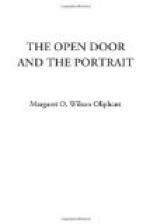But it was only at rare intervals that I went home. In the long vacation, as in my school holidays, my father often went abroad with me, so that we had gone over a great deal of the Continent together very pleasantly. He was old in proportion to the age of his son, being a man of sixty when I was twenty, but that did not disturb the pleasure of the relations between us. I don’t know that they were ever very confidential. On my side there was but little to communicate, for I did not get into scrapes nor fall in love, the two predicaments which demand sympathy and confidences. And as for my father himself, I was never aware what there could be to communicate on his side. I knew his life exactly,—what he did almost at every hour of the day; under what circumstances of the temperature he would ride and when walk; how often and with what guests he would indulge in the occasional break of a dinner-party, a serious pleasure,—perhaps, indeed, less a pleasure than a duty. All this I knew as well as he did, and also his views on public matters, his political opinions, which naturally were different from mine. What ground, then, remained for confidence? I did not know any. We were both of us of a reserved nature, not apt to enter into our religious feelings, for instance. There are many people who think reticence on such subjects a sign of the most reverential way of contemplating them. Of this I am far from being sure; but, at all events, it was the practice most congenial to my own mind.
And then I was for a long time absent, making my own way in the world. I did not make it very successfully. I accomplished the natural fate of an Englishman, and went out to the Colonies; then to India in a semi-diplomatic position; but returned home after seven or eight years, invalided, in bad health and not much better spirits, tired and disappointed with my first trial of life. I had, as people say, “no occasion” to insist on making my way. My father was rich, and had never given me the slightest reason to believe that he did not intend me to be his heir. His allowance to me was not illiberal, and though he did not oppose the carrying out of my own plans, he by no means urged me to exertion. When I came home he received me very affectionately, and expressed his satisfaction in my return. “Of course,” he said, “I am not glad that you are disappointed, Philip, or that your health is broken; but otherwise it is an ill wind, you know, that blows nobody good; and I am very glad to have you at home. I am growing an old man—”




